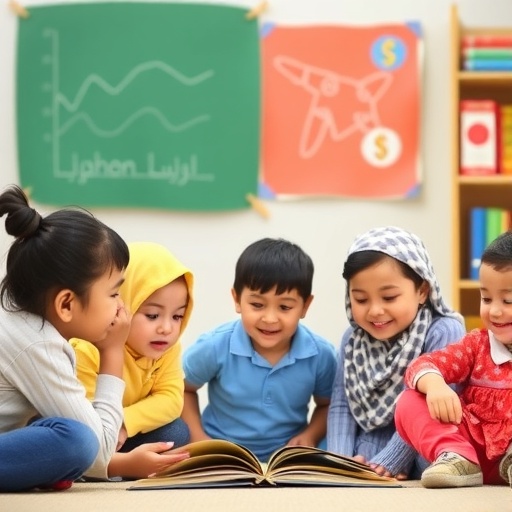In recent years, the educational landscape in the United Arab Emirates (UAE) has been evolving rapidly, particularly in the domain of early childhood education. This critical stage of development has garnered significant attention as educators and policymakers strive to enhance literacy outcomes among young learners. A groundbreaking study by Opoku, M.P., Alsheikh, N., and Tekin, A.K., sheds light on the multifaceted role of leadership in fostering literacy development within early childhood education settings across the UAE. This research delves into leadership dynamics, pedagogical strategies, and the socio-cultural influences that together shape early literacy programs.
Leadership in early childhood education is more than just administrative oversight; it is a transformative force that drives innovation and equity in learning experiences. The study emphasizes that effective leadership encompasses various aspects, including vision, collaboration, and the ability to inspire educators and stakeholders. A strong leader can create a conducive environment where literacy development is prioritized, leading to better educational outcomes for young children. This requires a keen understanding of both educational frameworks and cultural contexts, which are particularly relevant in the diverse and dynamic UAE.
Another essential facet of the study is the emphasis on inclusive practices in early childhood education. Leaders who adopt an inclusive approach recognize the diverse linguistic and cultural backgrounds of children in the UAE. By promoting bilingualism and multiculturalism, educators can nurture a love for reading and writing among all children, regardless of their native language. This not only enhances literacy skills but also fosters a sense of belonging and identity, essential components in a multicultural society like the UAE.
One of the significant challenges identified in the research is the need for ongoing professional development for early childhood educators. The landscape of literacy education is continually changing, influenced by new research, pedagogical theories, and technological advancements. Leaders must therefore prioritize continuous learning opportunities for educators, ensuring they have access to the latest resources and training. This commitment to professional growth is vital for translating effective early literacy strategies into practice.
The study also highlights the importance of collaboration among educators, families, and the community. Leadership in early childhood education is not an isolated endeavor; it thrives on partnerships and shared responsibilities. Engaging parents and caregivers in literacy initiatives can create a more holistic learning environment, reinforcing the skills young learners develop in school. The research suggests that when families are involved in their children’s literacy journey, children are more likely to achieve successful outcomes.
Furthermore, the authors advocate for research-informed practices in early childhood leadership. They argue that leaders should base their decisions on empirical evidence rather than anecdotal experiences. By grounding their approaches in well-researched strategies, educators can better address the specific literacy needs of their students. This evidence-based approach not only enhances the quality of education but also builds trust in leadership practices among educators and families.
The socio-cultural context of the UAE is critical to understanding the nuances of early childhood education leadership. The nation’s unique blend of tradition and modernity influences how educational practices are developed and implemented. Leaders who are sensitive to these cultural dynamics can create programs that resonate with families, thereby increasing engagement and participation in literacy initiatives. This connection between culture and education is vital for creating effective, meaningful learning experiences.
In terms of policy implications, the findings of the study suggest that educational authorities in the UAE should support the development of strong leadership frameworks in early childhood education. By aligning policies with best practices in leadership, the government can facilitate a more cohesive system that prioritizes literacy development across all schools. This systemic approach is essential for realizing the UAE’s vision of a knowledge-based economy, where literacy is a cornerstone of academic and vocational success.
Furthermore, the research underscores the importance of evaluating leadership effectiveness in early childhood education. Metrics for assessing the impact of leadership on literacy development should be established to guide future training and policy efforts. Leaders must be accountable for their roles in fostering high-quality educational environments and achieving literacy outcomes. This accountability will drive improvements and ensure that children receive the best possible start in their educational journeys.
The integration of technology in literacy development is another vital area explored in the research. As digital literacy becomes increasingly important, leaders in early childhood education must navigate the challenges and opportunities presented by technology. By equipping educators with the necessary skills to incorporate technology into their literacy programs, leaders can enhance engagement and facilitate access to diverse learning resources. This innovative approach prepares children for a future where digital competence is essential.
In conclusion, the study by Opoku et al. provides a comprehensive framework for understanding the critical role of leadership in early childhood education for literacy development in the UAE. By shedding light on the complex interplay between leadership, cultural context, and educational practices, the authors call for a more collaborative, inclusive, and evidence-based approach. As the UAE continues to advance its educational goals, the insights gleaned from this research will be invaluable for shaping effective literacy initiatives that cater to the diverse needs of young learners.
For stakeholders in early childhood education, the research highlights that investing in leadership development is crucial for sustainable literacy outcomes. Leaders must embrace their role as facilitators of change, continuously adapting to the evolving educational landscape. With the right support systems in place, the UAE can create an early childhood education framework that not only fosters literacy development but also sets the stage for lifelong learning and success.
Subject of Research: Early Childhood Education Leadership for Literacy Development
Article Title: Understanding Early Childhood Education Leadership for Literacy Development in the United Arab Emirates
Article References: Opoku, M.P., Alsheikh, N., Tekin, A.K. et al. Understanding Early Childhood Education Leadership for Literacy Development in the United Arab Emirates. IJEC (2024). https://doi.org/10.1007/s13158-024-00416-y
Image Credits: AI Generated
DOI: 10.1007/s13158-024-00416-y
Keywords: early childhood education, literacy development, UAE, educational leadership, inclusive practices, professional development, collaboration, evidence-based practices




